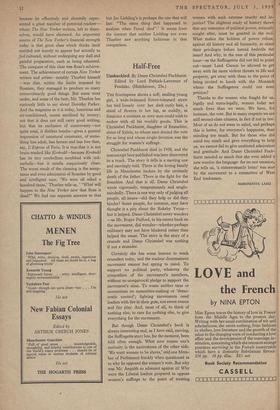Half-Free
Unshackled. By Dame Christabel Pankhurst. Edited by Lord Pethick-Lawrence of Peaslake. (Hutchinson, 25s.) Tim frontispiece shows a soft, smiling young girl, a wide-brimmed flower-trimmed straw hat tied loosely over her dark curly hair, a sheaf of flowers in her lap, as cuddly, as feminine a creature as ever man could wish to endow with all his worldly goods. This is Christabel Pankhurst, daughter of Emmeline, sister of Sylvia, to whom men denied the vote for so long and whose single devotion was the struggle for women's suffrage.
Christabel Pankhurst died in 1958, and the manuscript here published was later discovered in a trunk. The story it tells is a moving one and movingly told. There is the loving family life in Manchester broken by the untimely death of the father. There is the fight for the franchise. And that is all. Dame Christabel wrote vigorously, tempestuously and single- mindedly. There is one way only of judging all people, all issues—did they help or did they hinder? Some people, for instance, may have thought it a pity about the Rokeby Venus— but it helped. Dame Christabel never wonders —as Mr. Roger Fulford, in his recent book on the movement, did wonder—whether perhaps militancy may not have hindered rather than helped the cause. The story is the story of a crusade and Dame Christabel was nothing if not a crusader.
Certainly she has some lessons to teach crusaders today, and the nuclear disarmament movement cannot but spring to mind. To support no political party, whatever the sympathies of the movement's members, without an unequivocal pledge to support the movement's aims. To waste neither time or momentum on committee-making or 'demo- cratic control'; fighting movements need leaders with fire in their guts, not sweet reason and fair play. And, most of all, to think of nothing else, to care for nothing else, to give everything for the movement.
But though Dame Christabel's book is always interesting and, as I have said, moving, the Suffragette story has, for the moment, been told often enough. What now rouses one's curiosity is the motivations of the other side. 'We want women to be slaves,' said one Mem- ber of Parliament frankly when questioned as to why he opposed the women's vote. But why was Mr. Asquith so adamant against it? Why were the Liberal leaders prepared to oppose women's suffrage to the point of treating women with such extreme cruelty and in- justice? The slightest study of history shows that any extension of political power, seriously sought after, must be granted in the end. What makes the holders of power refuse, against all history and all humanity, to share their privileges before hatred bedevils the issue? And why, in the case of this particular issue—as the Suffragettes did not fail to point out—must Lord Carson be allowed to get away with far more violent threats to life and property, get away with them to the point of being invited to lunch with the Monarch whom the Suffragettes could not even petition?
Thanks to the women who fought for us, legally and extra-legally, women today are much freer than we were. We have, for instance, the vote. But in many respects we are still second-class citizens, in fact if not in law. Most of us do not seem to mind, and perhaps this is better, for everyone's happiness, than minding too much. But for those who did mind too much and gave everything to help us, we cannot fail to give unstinted admiration and gratitude. And Dame Christabel Pank- hurst minded so much that she even added a new word to the language: for on one occasion, she tells us, 'a stateswomanly letter' was sent by the movement to a committee of West End tradesmen.
MAROHANITA LASKI






























 Previous page
Previous page